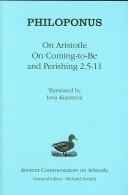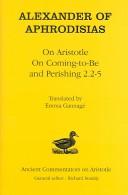| Listing 1 - 6 of 6 |
Sort by
|
Book
ISBN: 9780910956413 Year: 1958 Publisher: Cambridge (Mass.) : Medieval Academy of America,
Abstract | Keywords | Export | Availability | Bookmark
 Loading...
Loading...Choose an application
- Reference Manager
- EndNote
- RefWorks (Direct export to RefWorks)
Book
ISBN: 9781780938769 1780938764 Year: 2014 Publisher: New York (N.Y.) : Bloomsbury Academic,
Abstract | Keywords | Export | Availability | Bookmark
 Loading...
Loading...Choose an application
- Reference Manager
- EndNote
- RefWorks (Direct export to RefWorks)
SCIENCE --- History. --- Aristotle. --- De generatione et corruptione (Aristotle).
Book
ISBN: 9781472501257 147250125X Year: 2014 Publisher: London : Bloomsbury Academic,
Abstract | Keywords | Export | Availability | Bookmark
 Loading...
Loading...Choose an application
- Reference Manager
- EndNote
- RefWorks (Direct export to RefWorks)
Until the launch of this series over ten years ago, the 15,000 volumes of the ancient Greek commentators on Aristotle, written mainly between 200 and 600 AD, constituted the largest corpus of extant Greek philosophical writings not translated into English or other European languages. Subjects covered in this, the third and last, volume of translation of this work include: why the elements are four in number; what's wrong with Empedocles' theory of elements; how homogeneous stuffs, particularly the tissues of a living body, come to be and consist of the elements. The volume also contains very important discussions of causes, particularly of efficient cause, and of necessity in the sphere of generation and corruption. It is of interest to students of ancient philosophy and science (the commentary draws on earlier philosophical and medical texts); of Patristics and Christian Theology (it allows comparison of Philoponus' later creationist doctrine with his earlier ideas about generation); of medieval philosophy (this text was known to the Arabs; it is used by Avicenna and Averroes); and to anyone with interest in the metaphysics of causation, emergence, necessity and determinism.
Science --- Science. --- Science. --- Aristotle. --- De generatione et corruptione (Aristotle).
Book
ISBN: 9004320091 Year: 1946 Publisher: Leiden, The Netherlands : E.J. Brill,
Abstract | Keywords | Export | Availability | Bookmark
 Loading...
Loading...Choose an application
- Reference Manager
- EndNote
- RefWorks (Direct export to RefWorks)
Aristotle. --- Joachim, Harold H. --- De generatione et corruptione (Aristotle)

ISBN: 9781780938776 9780715628546 9781780938691 1780938691 9780715628522 9781472557759 9780715633045 1780938772 071563304X 0715628526 0715628542 1472557751 Year: 2014 Publisher: London : Bloomsbury,
Abstract | Keywords | Export | Availability | Bookmark
 Loading...
Loading...Choose an application
- Reference Manager
- EndNote
- RefWorks (Direct export to RefWorks)
The first five chapters of Aristotle's De Generatione et Corruptione distinguish creation and destruction from mere qualitative change and from growth. They include a fascinating debate about the atomists' analysis of creation and destruction as due to the rearrangement of indivisible atoms. Aristotle's rival belief in the infinite divisibility of matter is explained and defended against the atomists' powerful attack on infinite divisibility. But what inspired Philoponus most in his commentary is the topic of organic growth. How does it take place without ingested matter getting into the same place as the growing body? And how is personal identity preserved, if our matter is always in flux, and our form depends on our matter? If we do not depend on the persistence of matter why are we not immortal? Analogous problems of identity arise also for inanimate beings. Philoponus draws out a brief remark of Aristotle's to show that cause need not be like effect. For example, what makes something hard may be cold, not hard. This goes against a persistent philosophical prejudice, but Philoponus makes it plausible that Aristotle recognized this truth. These topics of identity over time and the principles of causation are still matters of intense discussion.
Aristote, --- Science --- Aristotle. --- De generatione et corruptione (Aristotle). --- Science. --- Aristotle --- Aristote --- Aristotle. - De generatione et corruptione

ISBN: 0715633031 9780715633038 1472557743 9781472557742 Year: 2014 Publisher: London : Bloomsbury,
Abstract | Keywords | Export | Availability | Bookmark
 Loading...
Loading...Choose an application
- Reference Manager
- EndNote
- RefWorks (Direct export to RefWorks)
This important commentary by Alexander of Aphrodisias on Aristotle's work on biochemistry was previously lost. However, four chapters of it have been re-identified in an Arabic translation by Emma Gannage and are here translated for the first time. The chapters were preserved in the writings of an eighth-century alchemist, Jabir ibn Hayyan. In addition to preserving an interesting example of very early cross-cultural scientific activity in the Muslim world, the newly discovered material is of philosophical importance: We learn how Alexander attempted to provide a unified theory that would unite Aristotle's chemistry with his elemental physics. As well as an English translation of the text, this volume includes a detailed introduction demonstrating the authenticity of the work and discussing its contribution to our understanding of ancient science.
Chemistry --- Chimie --- Early works to 1800. --- Ouvrages avant 1800 --- Aristotle --- Aristotle. --- Biochemie. --- Chemistry. --- Morfologie (biologie). --- Natuurfilosofie. --- Physics --- Physics. --- Science, Ancient. --- Alexander, --- Aristoteles, --- Alexander (Aphrodisiensis). --- Aristoteles. --- De generatione et corruptione (Aristotle). --- Science, Ancient --- Philosophy, Ancient --- Aristoteles, - 0384-0322 av. J.-C. --- Aristote --- Appréciation.
| Listing 1 - 6 of 6 |
Sort by
|

 Search
Search Feedback
Feedback About UniCat
About UniCat  Help
Help News
News